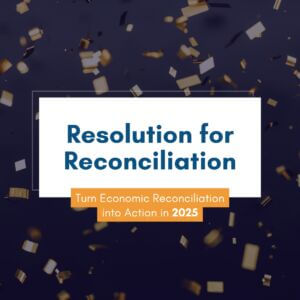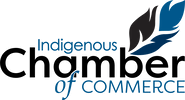By Gabriel Louër

A New Year’s Commitment for Canadian Businesses
As we step into a new year, Canadian businesses have an important opportunity to respond meaningfully to the Truth and Reconciliation Commission's (TRC) Call to Action 92.
This call to action urges the corporate sector to engage in economic reconciliation with Indigenous communities, and it is more critical than ever for businesses to develop strategies that foster long-term partnerships and support the empowerment of Indigenous peoples.
Economic reconciliation is about more than corporate social responsibility, it's about fostering genuine relationships and addressing historical injustices. This year, Canadian businesses should make it their resolution to actively contribute to reconciliation by adopting a proactive strategy.
The key to this strategy lies in understanding and addressing the specific needs of Indigenous communities while creating pathways for sustainable, mutually beneficial economic opportunities.
The first step in this process is self-reflection and education. Businesses should seek to educate themselves and their teams on the history and realities of Indigenous peoples in Canada, particularly their economic history, rights, and current challenges.
In doing so, this understanding should inform decisions and corporate policies, making them more inclusive and ultimately aiming to resolve current challenges. Moreover, it is also important to engage with Indigenous communities directly, seeking their guidance and ensuring that their voices are central in decision-making processes.
Secondly, businesses should prioritize Indigenous inclusion in the workforce. This can be achieved by offering employment opportunities, internships, and apprenticeships designed specifically for Indigenous people, helping to bridge the employment gap.
Additionally, supporting Indigenous entrepreneurship by investing in Indigenous-owned businesses or forming partnerships with them is a powerful way to promote economic growth for all parties.
Finally, businesses should review their supply chains and consider sourcing goods and services from Indigenous suppliers. This builds local economies and strengthens relationships while promoting long-term sustainability. In doing so, businesses show their commitment not only to reconciliation but also to the prosperity of all Canadians.
By adopting a resolution for reconciliation, Canadian businesses have the chance to make meaningful strides towards a more inclusive and equitable society. This upcoming year presents an opportunity to move beyond rhetoric and take tangible steps toward a future where Indigenous communities can thrive in partnership with the broader economy.
Resources
Indigenous Business Directory (IBD)
- The IBD is the Indigenous Chamber’s trusted and verified listing of Indigenous-owned businesses in Manitoba, offering a valuable resource for government agencies, NGOs, private companies, and other organizations seeking Indigenous expertise and services.
Reconciliation Education: 4 Seasons of Reconciliation
- 3-hour multi-media e-learning is an engaging means of meeting the requirements of TRC #92 and helping your organization implement anti-racism culture & awareness.
University of Alberta, Indigenous Canada
- Indigenous Canada is a 12-lesson Massive Open Online Course (MOOC) from the Faculty of Native Studies that explores the different histories and contemporary perspectives of Indigenous peoples living in Canada.
Indigenous people involvement in business on the rise says author, Carol Ann Hilton
- "Hilton’s authored the book Indigenomics: Taking a Seat at the Economic Table which highlights the emerging Indigenous economy and igniting the $100 billion Indigenous economy."



